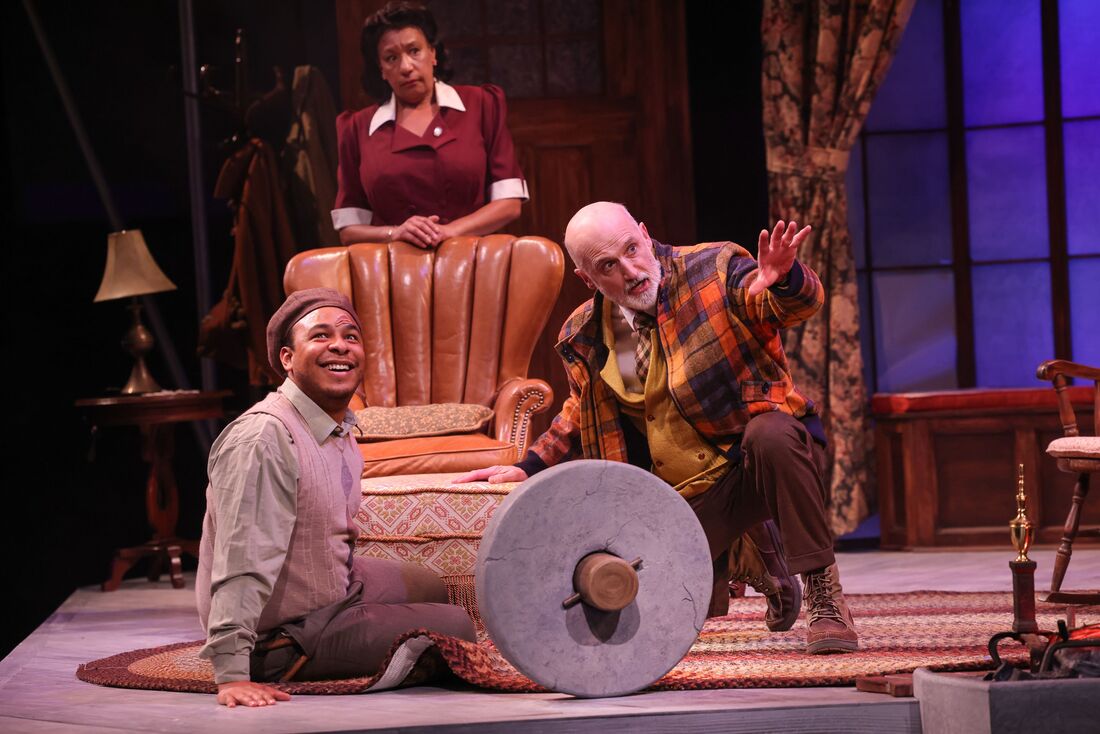|
PlayMakers The Skin of Our Teeth. ANTHONY AUGUST, KATHRYNHUNTER-WILLIAMS, RAY DOOLEY. Photo by HuthPhoto. The Skin of Our Teeth is a play by the once-ubiquitous Thornton Wilder. A moving allegory, it's both complex and convoluted, making it not the best fit for today’s modern audiences, who demand a faster pace and more straightforward meaning. However, PlayMakers Repertory Company’s production, beautifully directed by Vivienne Benesch, updates the script just enough to make it palatable for modern audiences, without losing any of the magic or beauty of the original.
The story opens with an announcer (Jeffrey Blair Cornell) setting the snarky, irreverent tone, as well as the time and place . . . which are somewhat debatable, as well as fleeting, as the show progresses. Indeed, the first act, full of dense dialogue and fourth-wall-breaking, takes place both in the 20th century and at the tragic start of the Ice Age . . . except it’s also biblical times. If you’re confused, that’s okay. In fact, it’s exactly what Wilder intended. His goal, in the early 1940s when the script was penned, was to make viewers question how this world came to be, how all the pieces came together, and how those pieces, real, imagined, or agglomerated, have affected human evolution. Agglomeration is really the key word here. By combining all the pieces that make up the modern human psyche, Wilder’s script posits tough questions about progress, its definition, and how the very definition itself is impacted by the inescapable confines of experience and found culture. While that’s all a lot to digest, this production somehow makes it seem light, easy, and even expected. Leading the way is Sabina, powerfully portrayed, throughout the ages and various iterations, by an apt Tori Jewell. Whether she’s an annoyed maid, a disgruntled actress, or a tempting seductress, she manages to both convey her characters and their frustrations while also serving as a way for the audience to vent their own confusions and frustrations. A play within a play within a play, this wonderfully-staged show challenges viewers to embrace the confusion they feel as they watch, to connect it to the piece, and to contemplate. The onstage moments are filled with wonder - think a moving, high-tech set, video, and practical but cool storm effects- but they are a mere (but beautiful) distraction to the story and its complexities, which is exactly how it should be. Life, as the script proposes, shouldn’t be all about simple pleasures . . . or should it? One will have to sift through the beauty of the production and the power of the performances in order to make that judgment call. In fact, it is that- the space this show gives the viewer in which to think, to ponder, and the mental space its viewing takes up afterwards - that is the most powerful. The always-wonderful Ray Dooley adds the appropriate complexity and imperfection into his inventor-prophet-caveman-man character, Mr. Antrobus, while Kathryn Hunter-Williams provides strong (perhaps even stronger) backing as Mrs. Antrobus. Cornell effortlessly slips in and out of various roles, with his total command of stage present in each, and Omolade Wey and Anthony August make for convincing children. Also nice here is the use of color- particularly red to signify sin, subversion and their power- in McKay Coble’s costuming choices- and the puppeteering/manning of the wooly mammoth (AhDream Smith) and dinosaur (Khalil LeSaldo). As man survives destruction after destruction, only to rise again, the only question that remains is what can we do better this time? And, through smart casting choices and nods to the present, this production provides time-appropriate responses, or rather questions. These questions are at the heart of this production and its power. It’s not an easy show, and it’s only a “fun” show if viewers only graze the surface, which they’re welcome to do. But, viewers who dare to dig deeper, to destruct and reconstruct, just as these characters do, will find much to contemplate.
2 Comments
1/26/2023 07:27:20 am
hanks for sharing the article, and more importantly, your personal experience of mindfully using our emotions as data about our inner state and knowing when it’s better to de-escalate by taking a time out are great tools. Appreciate you reading and sharing your story since I can certainly relate and I think others can to
Reply
1/26/2023 07:33:20 am
ks for sharing the article, and more importantly, your personal experience of mindfully using our emotions as data about our inner state and knowing when it’s better to de-escalate by taking a time out are great tools. Appreciate you reading and sharing your story since I can certainly relate and I think others can to
Reply
Leave a Reply. |
TAR
We love the arts. We write about them. Founded 2018. Categories
All
Archives
January 2024
|


 RSS Feed
RSS Feed